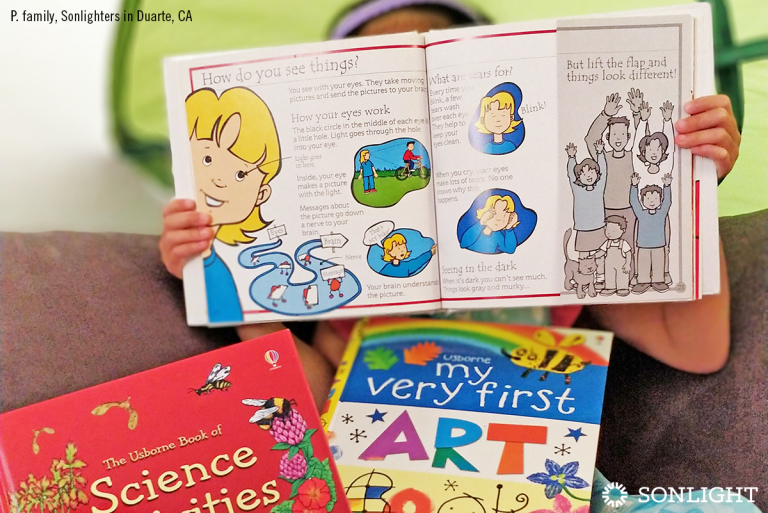
As parents who homeschool, we are deeply invested in our children. We long for our kids to be happy, to succeed, and to benefit from our life lessons. Yet, sometimes our desires for our children are so intense that we are overcome with angst. Our efforts to help our kids may feel overbearing or controlling.
We may focus so much on the future, we fail to connect with the family we have in front of us now. We spend more time worrying about our kids' reading level or how well they know world geography than we do enjoying the process of learning alongside them.
Too narrow a focus—aimed at academic achievement and impending adulthood—can mute the joy of day-to-day homeschooling.
In The Self-Driven Child, authors William Stixrud and Ned Johnson offer five keys to maintaining a non-anxious presence for our kids. I am striving to apply these parenting principles to my role as a Christian homeschool mom so I can live more fully in the moment. I'm learning to relinquish some control to my children and even more to my heavenly Father as I learn to be a non-anxious homeschool mom for my children.
1. Prioritize Enjoying Our Kids
“Children are a gift from the Lord; they are a reward from him.” Psalm 127:3, NLT
The benefit our kids receive when we are genuinely happy to spend time with them is huge! We are conveying to them that we find them valuable and that we like them. This assurance builds resilience and confidence that they are lovable.
Not every moment of homeschooling is fun, but our kids need to know that we enjoy their company. This may be as small as making sure we smile when they enter a room.
Faking it won’t work. If enjoying our kids is truly a struggle, it’s time to devote energy to identifying and removing barriers such as anger, depression, discipline issues, or lack of social support so we are free to enjoy our kids.
2. Do Not Fear the Future
“Don’t worry about anything; instead, pray about everything.” Philippians 4:6, NLT
We have very little control over the future; furthermore, worry has never solved anything. If we spend resources worrying about possibilities, we miss the enjoyment of the present day.
Eventually, most children will overcome their struggles.
- An angry adolescent is very likely to become a contented and successful adult.
- A struggling, emergent reader will learn to read in time.
- A scatterbrained child will grow to be responsible.
Give your kids love and support. Pray for guidance and do your best. Let the fear go; it’s contagious.
3. Commit to Stress Management
“Do you not know that you are God’s temple and that God’s Spirit dwells in you?" 1 Corinthians 3:16, ESV
What children want most is happy parents. A happy parent is one who feels healthy and at peace. As homeschooling parents, it can be easy to overlook our own needs and focus solely on the needs of our young charges. We must devote time and energy to ourselves if we are to take care of others.
- Get enough sleep
- Exercise
- Eat well
- Pray
- Meditate or practice mindfulness
- Spend time with friends
- Enjoy hobbies
4. Acknowledge Our Worst Fears
“Fathers, do not exasperate your children; instead, bring them up in the training and instruction of the Lord.” Ephesians 6:4, NIV
We can’t protect our children from all pain and suffering. Doing so would preclude their being able to live their own lives. Challenges and roadblocks are what shape us. In fact, our children need opportunities for struggle and growth.
Managing risk and dealing with disappointments is part of building resilience. Give your children responsibility over their own choices. Let them pursue a seemingly impossible goal. Their own successes and failures will teach them more than your verbal lessons ever could.
5. Love the Child We Have
“And whoever welcomes one such child in my name welcomes me.” Matthew 18:5, NIV
By accepting our children—with all of their gifts and imperfections alike—we are offering unconditional love. We do not need to condone bad behavior or approve mediocre efforts to be accepting. We simply need to respect our children by acknowledging where they are in their life’s path.
By accepting that our child struggles with fractions or is uncomfortable with public speaking, we can choose to maintain a supportive and honest relationship. We can take action by focusing on strengths, offering assistance, or setting limits. Loving them as they are models acceptance and sends the message that they are worth more than an algebraic fraction, a test score, or a diploma.
Learning alongside our children through reading and discussing great books builds the parent-child bond. Learn more about this type of family life—discover Sonlight.








I found a great deal of comfort in the words I found researching this article! I'm so glad to hear you think it's helpful. :)